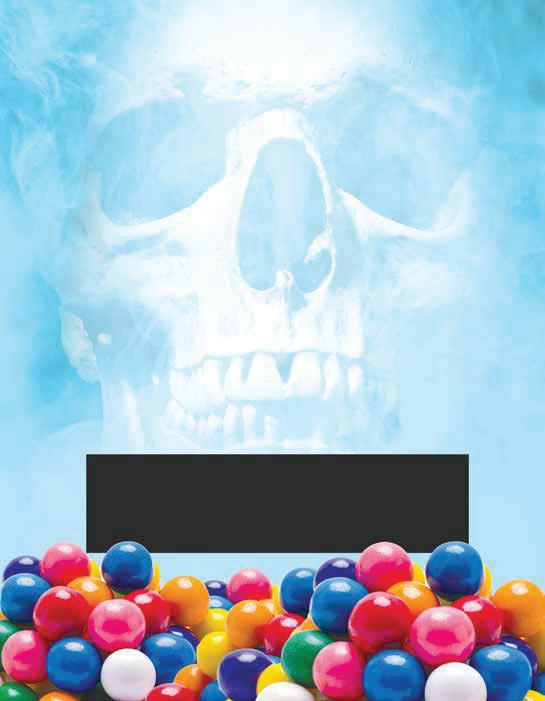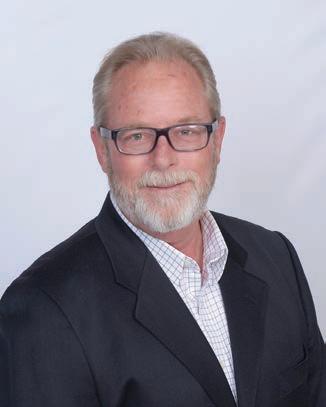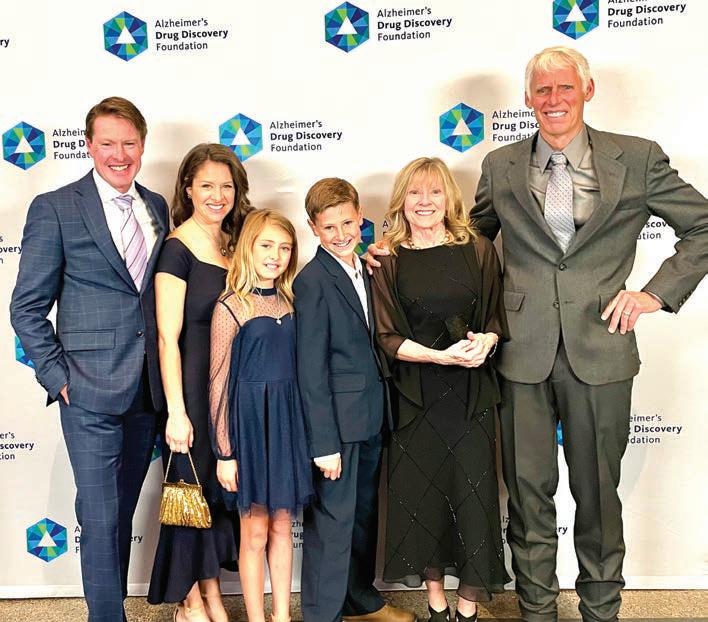
4 minute read
Thrift Shop & Food Pantry
Our those experiencing crisis or sudden hardship • To provide consultation and advice regarding additional support services in the vicinity. sometimes we get so much clutter in our brains that we may do something wrong or di erent like misplace our keys or forget something on the chore list,” she explained. e line between forgetfulness and an Alzheimer’s disease diagnosis would be when someone suddenly doesn’t know where they are, Reiss said. ey wander o or try to go someplace from the past.


Another big one, she added, is not getting words right.
“Not just mispronouncing,” said Reiss, who is an associate professor of medicine at the NYU Long Island School of Medicine, “but when you can’t nd the words or when you forget something basic like your own phone number. After a point, it becomes clear that it cannot be attributed to a normal situation.”
Before the diagnosis
Mace spent his life as a hard-working trial attorney, forsaking sleep to do it all – spending time with his family while working long hours at his practice. He began competing in adventure racing in the 1980s when the grueling sport was forming and competed in all eight Eco-Challenge races from 1995 to 2002.




Travis, following in his dad’s footsteps, became an accomplished ultra-athlete, traveling around the world to race professionally. Prior to Mace’s diagnosis, the father and son did hundreds of the same races, mostly solo events in which both entered.
“We did lots of the same adventure races in which Dad competed on a team with friends and I raced for the win with a competitive team,” Travis explained.
In 2019, a year after Mace’s diagnosis, the duo traveled to Fiji to race in the revived Eco-Challenge, a 10-day, 417-mile race with 280 competitors who traversed mountains, rivers, swamps and oceans, the rst time the two had competed on the same team. While the team did not nish, Travis considered it a win because endurance racing doesn’t have a category for competitors with Alzheimer’s disease.
The beginning
Mace said leading up to his diagnosis, he noticed he wasn’t talking properly, making his trial-attorney career more di cult.
Mark “Mace” Macy and his son Travis Macy with the book they co-wrote with Patrick Regan called “A Mile at a Time: A father and son’s inspiring Alzheimer’s journey of love, adventure and hope,” which chronicle’s the family’s journey with the disease.

“Word nding had become more di cult for him,” wife Pam said, “but not to where anyone would notice.”
Mace saw a neurologist, and a brain MRI came back normal, so they thought he was in the clear. But the symptoms kept persisting: things like Mace couldn’t read a map, and he suddenly had di culty pulling a car into a parking space.
But concern about Mace’s health had to wait while Pam received a kidney transplant. Mace wasn’t a match, but he donated one anyway to someone else who needed one. Donors must be in excellent health to donate.
When Mace was diagnosed with Alzheimer’s disease, the doctor told him to start getting his a airs in order immediately and to take a family trip soon.
“We weren’t surprised by the diagnosis,” Pam said, “but we were still shocked. He is the healthiest person I know. I have had the health issues, so we thought I’d be the rst to go. ( e diagnosis) was reorienting as we think about the future.”
Travis added: “When the diagnosis came, it was not a surprise, but it hit me like a ton of bricks. It was really tough. For me, initially, it was a mad scramble to try to nd a cure and treatments. Immediately, we have to gure out nances, putting things into a trust, maybe we need to build a house on my parents’ property so we can take care of them. In hindsight, I was trying to control something uncontrollable.”
Since his diagnosis nearly ve years ago, Mace is losing more cognitive abilities: he no longer drives a car, he sometimes has di culty reading and writing and his balance isn’t what it once was.
In addition to his wife and son, he has strong support from his two daughters, Katelyn Macy Sandoval of Denver and Donavahn Macy of Tampa, Florida, plus ve grandchildren to play with.



Reiss said the degree of stress and sadness for both the person with the Alzheimer’s diagnosis and that person’s loved ones can be overwhelming.
“ e outcome is inevitable,” she said. “ is disease only goes in one direction, and the nal pathway is grim. Living with this person you love and watching the loss of that is just horrendous.”
Plus caregivers, who want to take care of their loved one themselves, face stress and depression because they become xated on caring for the other person, not themselves. She said caregivers must take care of themselves and lean on family members and friends for support. e disease’s toll can be seen in the races that father and son have undertaken as time goes by. ey ran the Leadville 50-mile race in 2021, the Leadville Marathon in 2022, and they are planning to do the Leadville 10K this year.
Coping with Alzheimer’s Travis said Mace has had sayings during races and life. In fact, Mace has a tattoo that says “It’s all good training” on his forearm because he believes there’s value in going through something di cult. at’s Mace’s attitude toward Alzheimer’s disease.




“I have realized that winning doesn’t matter; I just want to run with my dad,” Travis explained. e family knows that Mace’s health continues to deteriorate, so they are planning for the future while still trying to be present in the here and now.
Mace wants people to know that people with Alzheimer’s disease are like everyone else, and they go on with life, though a little di erently.
10

“Just love the person (with Alzheimer’s),” Pam said. “ ey are the same person. As things change, we will have to change. It’s not going to get easier.”
Pam, already patient with an optimistic outlook, said she’s learned that it’s OK to ask for help.
Helping others
Pam said it was important for them to reach out to others on the Alzheimer’s disease journey to share information and to connect for support.
“Why stay home and hide?” she asked.
Travis said connecting with others on the same path has become a new mission, and a big goal of the book is to make a di erence and help people. Secondarily, it gave father and son something to do together.
“We are not Alzheimer’s experts,” Travis said, “but we are sharing our story.”
Mace continues to nd happiness in his life, and Travis attributes that “to my mom being incredibly supportive and energetic.”
“What is important to know,” Mace said, “is you will still be OK even after the diagnosis. I’m still an athlete and as good as I ever was. I’m perfectly happy. I have a great family.”








